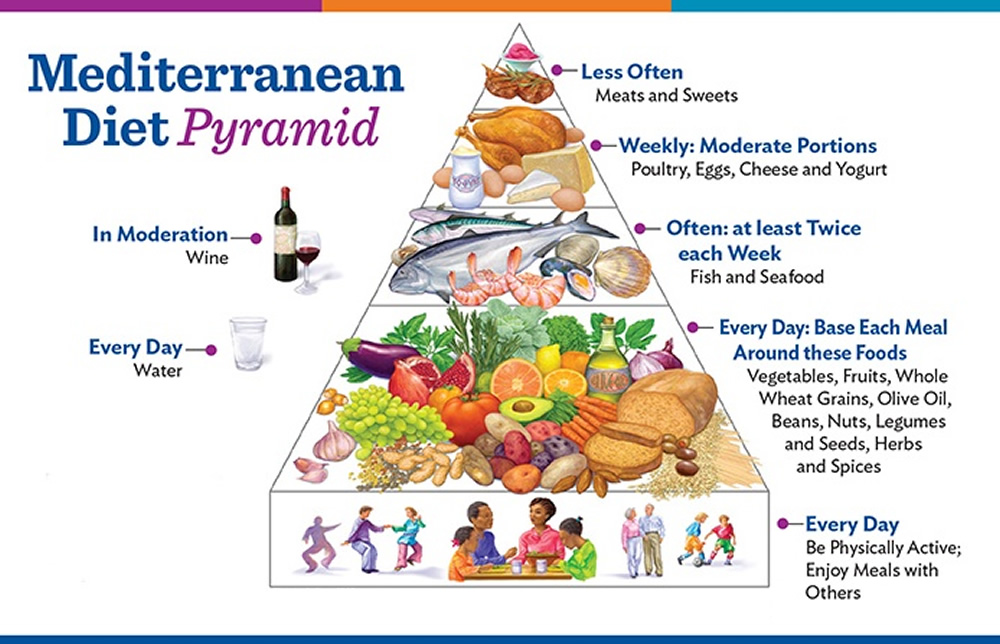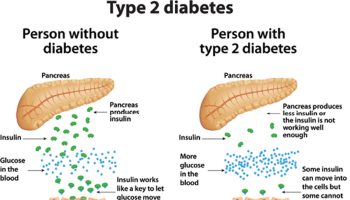What is the Mediterranean Diet
The Mediterranean Diet is a way of eating rather than a formal diet plan. The Mediterranean Diet features foods eaten in more than 20 countries bordering the Mediterranean Sea including Greece, Spain, southern Italy, Portugal, Morocco, Cyprus, Croatia and France and each has their own unique culture and cuisine. In reality there is no “one” Mediterranean Diet 1, which in 2010 was recognized by UNESCO as an intangible cultural heritage of humanity. The “Mediterranean diet” encompasses all of them—it’s not one size fits all 2. Despite regional variations, common components and cultural aspects can be identified, namely olive oil as the main source of lipids, the consumption of large amounts of seasonal vegetables, fruits and aromatic herbs (some of them gathered from the wild), as well as small intakes of meat and fish, often replaced or complemented with pulses, as sources of protein.
A Mediterranean-style diet typically includes:
- plenty of fruits, vegetables, bread and other grains, potatoes, beans, nuts and seeds are eaten daily and make up the majority of food consumed;
- olive oil as a primary fat source, may account for up to 40% of daily calories; and
- small portions of cheese or yogurt are usually eaten each day, along with a serving of fish, poultry, or eggs.
Fish and poultry are more common than red meat in the Mediterranean diet. The Mediterranean diet also centers on minimally processed, plant-based foods. Wine may be consumed in low to moderate amounts, usually with meals. Fruit is a common dessert instead of sweets.
Main meals consumed daily should be a combination of three elements: cereals, vegetables and fruits, and a small quantity of legumes, beans or other (though not in every meal). Cereals in the form of bread, pasta, rice, couscous or bulgur (cracked wheat) should be consumed as one–two servings per meal, preferably using whole or partly refined grains. Vegetable consumption should amount to two or more servings per day, in raw form for at least one of the two main meals (lunch and dinner). Fruit should be considered as the primary form of dessert, with one–two servings per meal. Consuming a variety of colors of both vegetables and fruit is strongly recommended to help ensure intake of a broad range of micronutrients and phytochemicals. The less these foods are cooked, the higher the retention of vitamins and the lower use of fuel, thus minimizing environmental impact.
The Mediterranean Diet is characterized by 3:
- An abundance of plant food (fruit, vegetables, breads, cereals, potatoes, beans, nuts, and seeds);
- Minimally processed, seasonally fresh, locally grown foods;
- Desserts comprised typically of fresh fruit daily and occasional sweets containing refined sugars or honey;
- Olive oil (high in polyunsaturated fat) as the principal source of fat;
- Daily dairy products (mainly cheese and yogurt) in low to moderate amounts;
- Fish and poultry in low to moderate amounts;
- Up to four eggs weekly;
- Red meat rarely; and
- Wine in low to moderate amounts with meals.
Here are some things you can do to switch from a traditional Western-style diet to a more Mediterranean way of eating.
- Dip bread in a mix of olive oil and fresh herbs instead of using butter.
- Add avocado slices to your sandwich instead of bacon.
- Have fish for lunch or dinner instead of red meat. Brush it with olive oil, and broil or grill it.
- Sprinkle your salad with seeds or nuts instead of cheese.
- Cook with olive or canola oil instead of butter or oils that are high in saturated fat.
- Choose whole-grain bread, pasta, rice, and flour instead of foods made with white flour.
- Add ground flaxseed to cereal, low-fat yogurt, and soups.
- Cut back on meat in meals. Instead of having pasta with meat sauce, try pasta tossed with olive oil and topped with pine nuts and a sprinkle of Parmesan cheese.
- Dip raw vegetables in a vinaigrette dressing or hummus instead of dips made from mayonnaise or sour cream.
- Have a piece of fruit for dessert instead of a piece of cake.
- Use herbs and spices instead of salt to add flavor to foods.
A Mediterranean-style diet can help you achieve the American Heart Association’s recommendations for a healthy dietary pattern that:
- emphasizes vegetables, fruits, whole grains, beans and legumes;
- includes low-fat or fat-free dairy products, fish, poultry, non-tropical vegetable oils and nuts; and
- limits added sugars, sugary beverages, sodium, highly processed foods, refined carbohydrates, saturated fats, and fatty or processed meats.
This style of eating can play a big role in preventing heart disease and stroke and reducing risk factors such as obesity, diabetes, high cholesterol and high blood pressure. There is some evidence that a Mediterranean diet rich in virgin olive oil may help the body remove excess cholesterol from arteries and keep blood vessels open.
The traditional Mediterranean dietary pattern is of particular interest to healthcare providers and dietary scientists, because of observations from the 1960s that populations in countries of the Mediterranean region, such as Greece and Italy, had lower mortality from cardiovascular disease compared with northern European populations or the US, probably as a result of different eating habits.
However, adherence to the Mediterranean diet dietary pattern has been rapidly decreasing in the region since 2000, particularly in Greece, Portugal and Spain – due to the wide dissemination of the fast-food culture. These observations point to a nutrition transition period that encompasses considerable changes in diet and physical activity patterns, which may be leading to an increase in the incidence of chronic and degenerative diseases in the Mediterranean region.
Traditionally characterized by vegetables, legumes, beans, fruits, nuts, seeds, olives, lots of extra virgin olive oil, high-fiber breads and whole grains and fish, this way of eating not only involves a low consumption of processed food, processed carbohydrates, sweets, chocolate and red meat. The recommended foods are rich with monounsaturated fats, fiber, and omega-3 fatty acids.
The Mediterranean Diet is associated with a lower incidence of mortality from all-causes 4 and is also related to lower incidence of cardiovascular diseases 5, type 2 diabetes 6, certain types of cancer 7, and neurodegenerative diseases 8. The Mediterranean diet is now recognized as one of the most healthy food patterns in the world.
Year after year, the Mediterranean diet comes out on top in the U.S. News and World Report annual ranking of best diets. The Mediterranean diet is also touted as one of the healthiest by many health organizations and dietitians 9.
The atmosphere, the state of being and mindset are equally important: people enjoying long, relaxed meals, the warm climate and a sea breeze full of negative ions. This lifestyle also encourages daily exercise — being active. So try to get at least 2½ hours of moderate aerobic activity a week. It’s fine to do blocks of 10 minutes or more throughout your day and week.
Choose exercises that make your heart beat faster and make you breathe harder. For example, go for a swim or a brisk walk or bike ride. You can also get some aerobic activity in your daily routine. Vacuuming, housework, gardening, and yard work can all be aerobic.
The Mediterranean diet is like other heart-healthy diets in that it recommends eating plenty of fruits, vegetables, and high-fiber grains. But in the Mediterranean diet, an average of 35% to 40% of calories can come from fat. Most other heart-healthy guidelines recommend getting less than 35% of your calories from fat. The fats allowed in the Mediterranean diet are mainly from unsaturated oils such as fish oils, olive oil, and certain nut or seed oils (such as canola, soybean, or flaxseed oil) and from nuts (walnuts, hazelnuts, and almonds). These types of oils may have a protective effect on the heart.
Mediterranean Diet Food List
There’s no one “Mediterranean” diet food list because there are more than 20 countries bordering the Mediterranean Sea. Diets vary between these countries and also between regions within a country. Many differences in culture, ethnic background, religion, economy and agricultural production result in different diets. But the common Mediterranean dietary meal plan (source 10) has these characteristics:
- High consumption of fruits, vegetables, bread and other cereals, potatoes, beans, nuts and seeds
- Olive oil is an important monounsaturated fat source
- Dairy products, fish and poultry are consumed in low to moderate amounts, and little red meat is eaten
- Eggs are consumed zero to four times a week
- Wine is consumed in low to moderate amounts
Mediterranean Diet Meal Plan:
- Eating a variety of fruits and vegetables each day, such as grapes, blueberries, tomatoes, broccoli, peppers, figs, olives, spinach, eggplant, beans, lentils, and chickpeas.
- Eating a variety of whole-grain foods each day, such as oats, brown rice, and whole wheat bread, pasta, and couscous.
- Choosing healthy (unsaturated) fats, such as nuts, olive oil, and certain nut or seed oils like canola, soybean, and flaxseed. About 35% to 40% of daily calories can come from fat, mainly from unsaturated fats. More than half the fat calories in a Mediterranean diet come from monounsaturated fats (mainly from olive oil). Monounsaturated fat doesn’t raise blood cholesterol levels the way saturated fat does. (source 10).
- Limiting unhealthy (saturated) fats, such as butter, palm oil, and coconut oil. And limit fats found in animal products, such as meat and dairy products made with whole milk.
- Eating mostly vegetarian meals that include whole grains, beans, lentils, and vegetables.
- Eating fish at least 2 times a week, such as tuna, salmon, mackerel, lake trout, herring, or sardines.
- Eating moderate amounts of low-fat dairy products each day or weekly, such as milk, cheese, or yogurt.
- Eating moderate amounts of poultry and eggs every 2 days or weekly.
- Limiting red meat to only a few times a month in very small amounts. For example, a serving of meat is 3 ounces. This is about the size of a deck of cards.
- Limiting sweets and desserts to only a few times a week. This includes sugar-sweetened drinks like soda.
The positive findings have been plentiful:
- A plant-based Mediterranean diet supplemented with extra virgin olive oil or mixed nuts may counteract age-related cognitive decline in older adults, according to a report published online by JAMA Internal Medicine.
- A 2010 meta-analysis published in the The American Journal of Clinical Nutrition found that the Mediterranean diet conferred a significant benefit with regard to the risk of chronic diseases, such as cardiovascular disease.
- In 2014, two meta-analyses found that adherence to a Mediterranean diet was associated with a decreased risk of type 2 diabetes
- Another 2014 systematic review and meta-analysis found that adherence to the Mediterranean diet was associated with a decreased risk of cancer mortality.
- Due to the emphasis on fish and healthy fats which are needed for prostaglandin formation, the Mediterranean diet is beneficial for decreasing inflammation in the body.
- The biggest impact of Mediterranean is on lowering incidences of diabetes.
- The Mediterranean diet is associated with a reduced risk of cancer incidence.
- Other health benefits of Mediterranean diet are prevents heart disease, lowers the risk of a heart attack, lowers cholesterol, prevents type 2 diabetes and prevents metabolic syndrome.
A Mediterranean-style diet might help prevent:
- Stroke.
- Alzheimer’s disease and other dementia.
- Depression.
- Parkinson’s disease.
Mediterranean diet for the prevention of cardiovascular disease
Although a Mediterranean-style diet has demonstrated greater weight reduction compared with control diets in randomized, controlled trials 11, the most impressive benefits of the diet are related to cardiovascular morbidity and mortality. No isolated aspect of the Mediterranean Diet explains these benefits, but much has focused on the omega-3 polyunsaturated fatty acids. Examples of omega-3 polyunsaturated fatty acids include eicosapentaenoic acid (EPA) and docosahexaenoic acid (DHA) found in fatty fish like salmon, mackerel, herring, and trout 12. A form of omega-3 fatty acids derived from plants, alpha-linolenic acid (ALA), is found in nuts, canola (rapeseed) oil, flaxseed, flaxseed oil, and soybean oil 12. Alpha-linolenic acid (ALA) can be converted to EPA (eicosapentaenoic acid) and DHA (docosahexaenoic acid) 13, which are thought be cardioprotective 13, 14, 15, 16, 17, 18.
Multiple randomized, controlled trials have demonstrated the benefits of the Mediterranean Diet on secondary prevention of cardiovascular disease 19, 20, 21, 22, 23. The Diet and Reinfarction Trial (DART) 24 followed 2,000 men for two years to study the effect on the secondary prevention of myocardial infarction (MI). The men were randomized to four groups. One group received advice in accordance with American Heart Association dietary guidelines. Another group was advised to consume fish twice per week (300 g total) in order to achieve approximately 2.5 g of EPA weekly. A third group was told to increase cereal fiber intake to 18 g/day. A fourth group (controls) did not receive advice. In comparing the four groups, the fish group showed a 29% reduction in mortality compared with the control group. The rate of fatal MI was also less in the fish group.
One major mechanism of protection may be related to the anti-arrhythmic effects of omega-3 polyunsaturated fatty acids 25. Data from various animal, epidemiologic, and metabolic studies, as well as smaller clinical trials, demonstrate the benefits of omega-3 polyunsaturated fatty acids in reducing the risk of sudden cardiac death 26. Omega-3 polyunsaturated fatty acids also decrease the arachidonic acid content of cell membranes, reduce eicosanoids, downregulate gene expression of adhesion molecules, and inhibit the synthesis of proinflammatory cytokines such as tumor necrosis factor-alpha, interleukin (IL)-1, and IL-2 24. Moreover, fish oil supplements can lower triglycerides, inhibit endothelial cell activation, and improve endothelial function in diabetics 27. They can also reduce platelet aggregation 28 and decrease the heart rate 29.
Multiple prospective cohort studies support the benefit of a Mediterranean-style diet 30, 31, 32. Most recently, 22,043 patients from a Greek population completed a questionnaire for the European Prospective Investigation into Cancer and Nutrition 33. Investigators used a scale of 0 to 9 to estimate adherence to the Mediterranean Diet, with higher scores reflecting greater adherence. After a mean follow-up of 44 months, each two-point increment in adherence to the diet was associated with a 25% reduction in total mortality. Greater compliance was associated with reductions in CHD and cancer mortality. This study points to the possible synergistic effect of the Mediterranean Diet as a whole, rather than protective effects of any one aspect.
It is well established that diet plays a major role in cardiovascular disease risk. This review 34 assessed the effects of providing dietary advice to follow a Mediterranean-style dietary pattern to healthy adults or people at increased risk of cardiovascular disease in order to prevent the occurrence of cardiovascular disease and reduce the risk factors associated with it. Definitions of a Mediterranean dietary pattern vary and they included only randomised controlled trials of interventions that reported at least two of the following components: (1) high monounsaturated/saturated fat ratio, (2) low to moderate red wine consumption, (3) high consumption of legumes, (4) high consumption of grains and cereals, (5) high consumption of fruits and vegetables, (6) low consumption of meat and meat products and increased consumption of fish, and (7) moderate consumption of milk and dairy products. The control group was no intervention or minimal intervention. They found 11 randomized controlled trials (15 papers) that met these criteria. The trials varied enormously in the participants recruited and the different dietary interventions. Four trials were conducted in women only, two trials were in men only and the remaining five were in both men and women. Five trials were conducted in healthy individuals and six trials were in people at increased risk of cardiovascular disease or cancer. The number of components relevant to a Mediterranean dietary pattern ranged from two to five and only seven trials described the intervention as a Mediterranean diet.
The review 34 concluded that, from the limited evidence to date, a Mediterranean dietary pattern reduces some cardiovascular risk factors. However, more trials are needed to look at the effects of the different participants recruited and the different dietary interventions to see which interventions might work best in different populations.
The Mediterranean Diet Effect on Good HDL Cholesterol
A Mediterranean diet rich in virgin olive oil may improve the function of “good” HDL cholesterol in people at risk for heart disease, according to a new long-term, large-scale, randomized controlled trial 35.
The biological functions of high-density lipoproteins (HDLs) — HDL cholesterol — the “good” cholesterol — is to eliminate or remove excess cholesterol from the bloodstream, whereas high levels of LDL, or “bad,” cholesterol and triglycerides, a type of blood fat, increase the risk of heart and blood vessel diseases. The new study 35 concluded the Mediterranean diet rich in virgin olive oil improved key HDL functions, including helping the body remove excess cholesterol from arteries, serving as an antioxidant and keeping blood vessels open — all of which reduce cardiovascular risk.
Mediterranean Diet Summary
Research continues to show the Mediterranean Diet, based on healthy foods and physical activity, is the best prescription for a long, healthy life. The incidence of heart disease in Mediterranean countries is lower than in the United States. Death rates are lower, too. But this may not be entirely due to the diet. Lifestyle factors (such as more physical activity and extended social support systems) may also play a part. It is also an excellent, enjoyable diet plan that is easy to follow and is flexible.
People who follow the average Mediterranean diet eat less saturated fat than those who eat the average American diet. In fact, saturated fat consumption is well within the American Heart Association dietary guidelines. More than half the fat calories in a Mediterranean diet come from monounsaturated fats (mainly from olive oil). Monounsaturated fat doesn’t raise blood cholesterol levels the way saturated fat does.
The new American Heart Association study 35 concluded the Mediterranean diet rich in virgin olive oil improved key HDL functions, including helping the body remove excess cholesterol from arteries, serving as an antioxidant and keeping blood vessels open — all of which reduce cardiovascular risk.
According to a review of a recent clinical trial involving 998 overweight or obese people (The American Journal of Medicine Dec 2015). Where the Mediterranean diet (which is rich in vegetables, fruits, grains, beans, and olive oil but light on meat, dairy, and eggs) were trialed against one or more of three other diets: a low-fat diet, a low-carb diet, and the American Diabetes Association (ADA) diet. Overall, people lost between 9 and 22 pounds after a year on the Mediterranean diet, which was similar to the number of pounds shed by those on a low-carb diet or the American Diabetes Association diet. In comparison, those on the low-fat diets lost between just 6 and 11 pounds.
However, despite good results coming from human studies on Mediterranean diet rich in virgin olive oil, before advising people to follow a Mediterranean diet, we need more studies to find out whether the Mediterranean diet rich in virgin olive oil itself or other lifestyle factors account for the lower deaths from heart disease.
Even if you don’t follow the Mediterranean diet faithfully, simply eating more of the foods on the Mediterranean diet meal plan, dining more leisurely, and being more active are superb health goals.
References- Altomare, R., Cacciabaudo, F., Damiano, G., Palumbo, V. D., Gioviale, M. C., Bellavia, M., Tomasello, G., & Lo Monte, A. I. (2013). The mediterranean diet: a history of health. Iranian journal of public health, 42(5), 449–457. https://www.ncbi.nlm.nih.gov/pmc/articles/PMC3684452
- Castro-Quezada, I., Román-Viñas, B., & Serra-Majem, L. (2014). The Mediterranean diet and nutritional adequacy: a review. Nutrients, 6(1), 231–248. https://doi.org/10.3390/nu6010231
- F.B. Hu. The Mediterranean Diet and mortality—olive oil and beyond. N Engl J Med, 348 (2003), pp. 2595-2596
- Sofi F., Macchi C., Abbate R., Gensini G.F., Casini A. Mediterranean diet and health. Biofactors. 2013;39:335–342. doi: 10.1002/biof.1096
- Estruch R., Ros E., Salas-Salvadó J., Covas M.I., Corella D., Arós F., Gómez-Gracia E., Ruiz-Gutiérrez V., Fiol M., Lapetra J., et al. Primary prevention of cardiovascular disease with a Mediterranean diet. N. Engl. J. Med. 2013;368:1279–1290. doi: 10.1056/NEJMoa1200303
- Mitrou P.N., Kipnis V., Thiébaut A.C., Reedy J., Subar A.F., Wirfält E., Flood A., Mouw T., Hollenbeck A.R., Leitzmann M.F., et al. Mediterranean dietary pattern and prediction of all-cause mortality in a US population: Results from the NIH-AARP Diet and Health Study. Arch. Intern. Med. 2007;167:2461–2468. doi: 10.1001/archinte.167.22.2461
- Couto E., Boffetta P., Lagiou P., Ferrari P., Buckland G., Overvad K., Dahm C.C., Tjønneland A., Olsen A., Clavel-Chapelon F., et al. Mediterranean dietary pattern and cancer risk in the EPIC cohort. Br. J. Cancer. 2011;104:1493–1499. doi: 10.1038/bjc.2011.106
- Sofi F., Abbate R., Gensini G.F., Casini A. Accruing evidence on benefits of adherence to the Mediterranean diet on health: An updated systematic review and meta-analysis. Am. J. Clin. Nutr. 2010;92:1189–1196. doi: 10.3945/ajcn.2010.29673
- Widmer, R. J., Flammer, A. J., Lerman, L. O., & Lerman, A. (2015). The Mediterranean diet, its components, and cardiovascular disease. The American journal of medicine, 128(3), 229–238. https://doi.org/10.1016/j.amjmed.2014.10.014
- American Heart Association – Mediterranean Diet – http://www.heart.org/HEARTORG/HealthyLiving/HealthyEating/Nutrition/Mediterranean-Diet_UCM_306004_Article.jsp
- K. Esposito, R. Marfella, M. Ciotola, et al. Effect of a Mediterranean-style diet on endothelial dysfunction and markers of vascular inflammation in the metabolic syndrome. JAMA, 292 (2004), pp. 1440-1446
- P.M. Kris-Etherton, W.S. Harris, L.J. Appel, et al. Fish consumption, fish oil, omega-3 fatty acids, and cardiovascular disease. Circulation, 106 (2002), pp. 2747-2757
- S.M. Grundy. N-3 fatty acids: priority for post-myocardial infarction clinical trials. Circulation, 107 (2003), pp. 1834-1836
- U.N. Das. Beneficial effect(s) of n-3 fatty acids in cardiovascular disease: but why and how? Prostaglandins Leukot Essent Fatty Acids, 63 (2001), pp. 351-362
- P.C. Calder, R.F. Grimble. Polyunsaturated fatty acids, inflammation and immunity. Eur J Clin Nutr, 56 (Suppl 3) (2002), pp. S14-S19
- A. Leaf. The electrophysiologic basis for the anti-arrhythmic and anticonvulsant effects of n-3 polyunsaturated fatty acids: heart and brainLipids, 36 (Suppl) (2001), pp. S107-S110
- N.W. Schoene. Vitamin E and omega-3 fatty acids: effectors of platelet responsiveness. Nutrition, 17 (2001), pp. 793-796
- T.A. Mori, L.J. Beilin. Long-chain omega-3 fatty acids, blood lipids and cardiovascular risk reductions. Curr Opin Lipidol, 12 (2001), pp. 11-17
- R.B. Singh, M.A. Niaz, J.P. Sharma, R. Kumar, V. Rastogi, M. Moshiri. Randomized, double-blind, placebo-controlled trial of fish oil and mustard oil in patients with suspected acute myocardial infarction: the Indian Experiment of Infarct Survival-4Cardiovas Drugs Ther, 11 (1997), pp. 485-491
- R.B. Singh, G. Dubnov, M.A. Niaz, et al. Effect of an Indo-Mediterranean diet on progression of coronary artery disease in high risk patients (Indo-Mediterranean Diet Heart Study): a randomized single-blind trial. Lancet, 360 (2002), pp. 1455-1461
- Effects of changes in fat, fish, and fibre intakes on death and myocardial reinfarction: Diet and Reinfarction Trial (DART)Lancet, 2 (1989), pp. 757-761
- M. de Lorgeril, P. Salen, J.L. Martin, I. Monjaud, J. Delaye, N. Mamelle. Mediterranean Diet, traditional risk factors, and the rate of cardiovascular complications after myocardial infarction: final report of the Lyon Diet Heart Study. Circulation, 99 (1999), pp. 779-785
- The GISSI-Prevenzione Investigators. Dietary supplementation with n-3 polyunsaturated fatty acids and vitamin E after myocardial infarction: results of the GISSI-Prevenzione trial. Lancet, 354 (1999), pp. 447-455
- C. von Shacky. N-3 fatty acids and prevention of coronary atherosclerosis. Am J Clin Nutr, 71 (2000), pp. 224S-227S
- A. Leaf, J.X. Kang, Y. Xiao, G.E. Billman. Clinical prevention of sudden cardiac death by n-3 polyunsaturated fatty acids and mechanism of prevention of arrhythmias by n-3 fish oils. Circulation, 107 (2003), pp. 2626-2652
- J.X. Kang, A. Leaf. Prevention of fatal cardiac arrhythmias by polyunsaturated fatty acids. Am J Clin Nutr, 71 (2000), pp. 202S-207S
- A. Brown, F.B. Hu. Dietary modulation of endothelial function. Am J Clin Nutr, 73 (2001), pp. 673-686
- J. Dallongeville, J. Yarnell, P. Ducimetiere, et al. Fish consumption is associated with lower heart rates. Circulation, 108 (2003), pp. 820-825
- F.B. Hu, W.C. Willett. Optimal diets for prevention of coronary heart disease. JAMA, 288 (2002), pp. 2569-2578
- F.B. Hu, L. Bronner, W.C. Willett, et al. Fish and omega-3 fatty acid intake and risk of coronary heart disease in women, JAMA, 287 (2002), pp. 1815-1821
- C.M. Albert, H. Campos, M.J. Stampfer, et al. Blood levels of long-chain n-3 fatty acids and the risk of sudden death. N Engl J Med, 346 (2002), pp. 1113-1118
- R.N. Lemaitre, I.B. King, D. Mozaffarian, et al. n-3 Polyunsaturated fatty acids, fatal ischemic heart disease, and nonfatal myocardial infarction in older adults: the Cardiovascular Health Study. Am J Clin Nutr, 77 (2003), pp. 319-325
- A. Trichopoulou, T. Costacou, C. Bamia, D. Trichopoulos. Adherence to a Mediterranean Diet and survival in a Greek population. N Engl J Med, 348 (2003), pp. 2599-2608
- Cochrane Review 12 August 2013 – Mediterranean diet for the prevention of cardiovascular disease – http://www.cochrane.org/CD009825/VASC_mediterranean-diet-for-the-prevention-of-cardiovascular-disease
- the American Heart Association journal Circulation February 13, 2017;135:633-643 – Mediterranean Diet Improves High-Density Lipoprotein Function in High-Cardiovascular-Risk Individuals – http://circ.ahajournals.org/content/135/7/633






